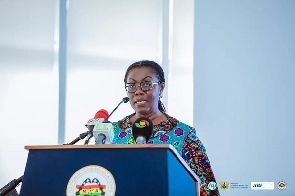Communications and Digitalisation Minister, Ursula Owusu-Ekuful, has said having a lot more women participating in the Ghanaian Science, Technology, Engineering and Mathematics (STEM) ecosystem will spur the country’s economic growth.
Citing the Council on Foreign Relations, an American think-tank specialising in U.S. foreign policy and international relations, she argued in a keynote address at the ‘Seats for Ladies in STEM’ initiative (S4LIS) launch that increasing women’s participation in STEM careers has the power to close the gender pay gap and boost women’s cumulative earnings by US$299billion over the next ten years, expediting global economic development in the process.
A brainchild of the Ghana Chamber of Telecommunications, S4LIS aims to close the yawning gender gap within the Science, Technology, Engineering and Mathematics (STEM) ecosystem of Ghana.
In view of the above, she said any development agenda to be championed by government will not gloss over the need to implement interventions which address the inequality in education and specific job environments.
The ministry, she said, “Has been supporting this agenda with its Girls-in-ICT Initiative, whereby girls are encouraged to pursue careers in the evolving and lucrative ICT industry and in recognition of the many more girls in deprived communities who need exposure to the programme.
“It is therefore gratifying to note that the Chamber is focusing on a more concerted effort aimed at ensuring that, in the next 5 years, we achieve near-parity when it comes to gender distribution in the field of STEM in Ghana. This for me is important, because it has implications for our national development,” U Owusu-Ekuful stated.
Commitment, collaboration critical for S4LIS success
Calling all stakeholders in the STEM ecosystem to prioritise collaboration in bridging the gender gap in the field of STEM, Ursula Owusu-Ekuful urged her colleague ministers and other state agencies to participate in this programme “to ensure there is an equitable distribution of women so far as STEM is concerned”.
She said: “The ministry puts much priority on digital skills as one critical pillar for the draft Digital Economy Policy, which is currently receiving inputs from stakeholders. I would encourage the drafting team to align S4LIS as one of the initiatives to be pursued in the strategies for the policy’s implementation.
Fast-tracking sustainable development
On her part, Chairperson of the Ghana Chamber of Telecommunications and Chief Executive Officer (CEO) of Vodafone Ghana, Patricia Obo-Nai, called for deliberate policies and strategies to have a lot more women actively participating in the STEM ecosystem; and said scientific work and technological innovations are “missing the invaluable perspectives and contributions of our women.
“So, as part of creating these concrete and practical measures to effectively bridge this gender gap in Ghana, the Ghana Chamber of Telecommunications with support from the Ministry of communications is today launching an industry sustainability initiative termed ‘Seats for Ladies in STEM’.”
She said the Seats for Ladies in STEM Initiative’s objective is to fast-tract Ghana’s sustainable development through STEM, by increasing the percentage of women taking up STEM-related jobs from 30 percent in 2021 to 40 percent by 2031 through a number of initiatives.
“Together, we can create a more diverse digital workforce and promote growth and innovation across our country, thus developing more holistic solutions which benefit all in society – directly impacting the lives of many young ladies and creating futures for their offspring as well,” said Mrs. Obo-Nai.
Business News of Wednesday, 21 December 2022
Source: thebftonline.com

















